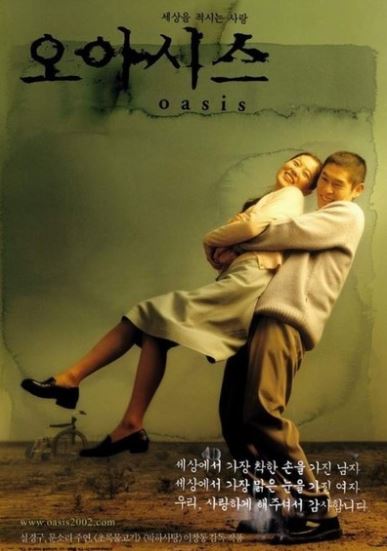A great film may not be easy to watch. It may highlight unlikeable characters. It might incite controversy or deal with difficult subject material or show uncomfortable scenes from society. The powerful Korean movie Oasis by Lee Chang-dong is one of those types of movies. Our Free Foreign Films Oasis Film Review:

lead characters
The film tells a story of an unlikely relationship between a man with an intellectual disability, Hung Jong-du (Sul Kyung-gu) , and a woman with a physical disability, Han Gong-ju (Moon So-ri). Jong-du knows Gong-ju’s family because he killed her father in a hit-and-run driving accident. He serves a prison sentence and inexplicably visits the family upon his release. He stumbles into seeing that Gong-ju has been abandoned by her family. She is unable to walk or care for herself very well and basic communication is very difficult. Jong-du is spontaneous, but he doesn’t think things through very thoroughly. He appears to have an intellectual disability, but maybe it is just social disfunction as he has more trouble navigating the world than typical persons. Gong-ju is intelligent and sensitive, but she has no relationship to anything outside her apartment.
tension
I sat through this entire film incredibly anxious with worry. I was afraid that Jong-du would harm the vulnerable Gong-ju. She was helpless and defenseless and susceptible to any physical accidents that the impulsive Jong-du might create. Jong-du’s heart is usually in the right place, but the decisions that he makes because of his intellectual disability are reckless and irresponsible. Many times, Gong-ju was totally in his care, and that made her defenseless to her environment and exposed to danger. Their relationship is marred at the beginning by unhealthy physical power dynamics and worse, assault, but it improbably eventually reaches the stage of more balanced and safe communication and mutual respect and possibly even love.
This Oasis Film Review would not be complete if I did not mention that this development made me uncomfortable and reminded me of certain countries where rape victims are forced to marry their rapists. Is it possible to fall in love with your rapist? Even in a situation where your rapist is the only one that shows you any attention or interest? Even in a situation where your rapist is the only one who gives you contact with the outside world? Jong-du is truly the only person that has any interest in any way for Gong-ju, but the circumstances surrounding their early encounters left me cringing as their relationship developed.
respite interludes
The only moments of respite that I received in this movie was when the actress playing Gong-ju Moon So-ri, entered dream-like fantasy sequences. These scenes allowed her to drop her crippling handicap and walk, talk and dance like a typical person. In one sequence she dances around a room with animals and children as a wall painting comes to life. In another, she quickly and easily climbs down off the back of her boyfriend and moves freely about her environment. She walks in and out of rooms without the incapacitating body spasms and twisting head and arm movements. She speaks her mind and argues her position. It was a testament to the acting skill of So-ri that I was briefly stunned each time she assumed the character without the disability. These fleeting but very welcome interludes allowed me some relief to be reminded that it was a movie scene played by a gifted actress, and I could relax and breathe and reset my emotions.
reflecting cultural prejudice
The movie was also difficult to watch because it mirrored some very difficult cultural messages from Korean and world society. The first was that persons with disabilities are less important than typical people and should be relegated to cheap apartments where society will never see them. This message carries through the entire film and is supported by almost all the characters. Gong-ju’s difficulty of being imprisoned in her apartment by her family is almost of no concern to anyone. It’s bad enough that the family would believe it is the proper way to treat her, but the neighbors too accept it as a totally normal situation. They all conspire – or at least look the other way – to thwart any efforts of social workers to ensure she is well-cared for and nurtured. The family even uses her handicap to secure a better apartment for themselves while leaving Gong-ju alone in an old, cramped room.
Even Jong-du is left to wander the streets alone after he leaves prison because his family has tried to evade him. He returns to familiar places, but everyone has moved. No one wants to be responsible for his care and well-being.
That everyone involved would accept this situation without regard for the person with the handicap is a realistic reflection on our society. The viewer accepts this situation because we know it to be true. It is totally believable that a person with a handicap might be hidden away from the world or ignored because they are a burden on the family and because they create unnecessary hardships.
exposing our weaknesses
On several occasions in this movie, the voice of those with disabilities is unnoticed. Even when they make great effort to be heard, they go ignored or other words are put in their mouths. Their voices are not as important as those of typical individuals. Here we are not to be a voice for the voiceless but to recognize and honor their own voice.
They are not to be seen or heard because they represent the weaknesses in our societal systems. If a person with a disability is seen struggling, then accommodations for that person are inadequate or have failed. A person with a handicap making a great effort to do typically routine tasks illustrates flaws and vulnerabilities in the adaptations and modifications that we have deemed appropriate. The voice of someone with a disability might say things that are disagreeable. They might attack our sensibilities. They may challenge the status quo. Their voices may point out that we are wrong and clearly show that we do not care as much as we could.
disempowering the marginalized
Another cultural message that is reflected in this film is that homogeneity and uniformity is the norm, and we should all strive for that. Those who behave a bit differently are outsiders on the margins of society and should work to conduct themselves the same way as everyone else. If someone behaves differently, then it is logical to remove them from society and separate them from all of the other “good” people.
This sentiment was probably more common in Korea that it was in America twenty years ago when the movie came out, but there must still be strong elements of it in both countries. The implication is that those on the margins contribute less to society or are threatening to society and are therefore of lesser worth. In Oasis the marginalized are people with disabilities. But it could also easily mean the poor, the immigrant, the widow, the orphan, the refugee, the elderly, the sick and needy.
These groups are often subject to our anger or resentment because they lack agency or power and are unable to fight back. We may identify something in ourselves that is inadequate or imperfect and these perceived flaws causes bitterness or hatred toward others who may characterize or embody these same weaknesses. We may hate ourselves for our failings, but this anger is directed outwardly toward these marginal groups.
In the movie, Jong-du’s brothers hate him for representing their own mistakes and imperfections. They see his innocence reveals a love of people better than their own. They berate him for his choices, but they are really criticizing themselves for unacknowledging the sacrifices he has made for them.
oasis film review summary
Oasis is not an easy to watch film, but it is a great film. It exposes our weaknesses and prejudices regarding the marginalized and forces us to confront these vulnerabilities uncompromisingly.
For more thoughts on and movies by Lee Chang-dong, see the review of Burning. This Oasis Film Review can be found on the Free Foreign Movies website.
Watch the Korean Movie Oasis for Free on YouTube.
